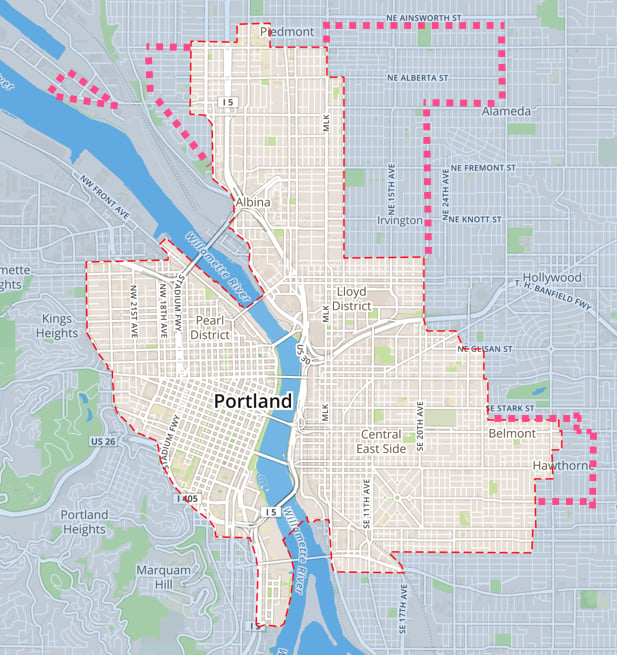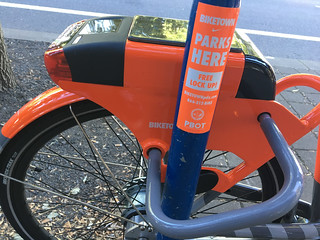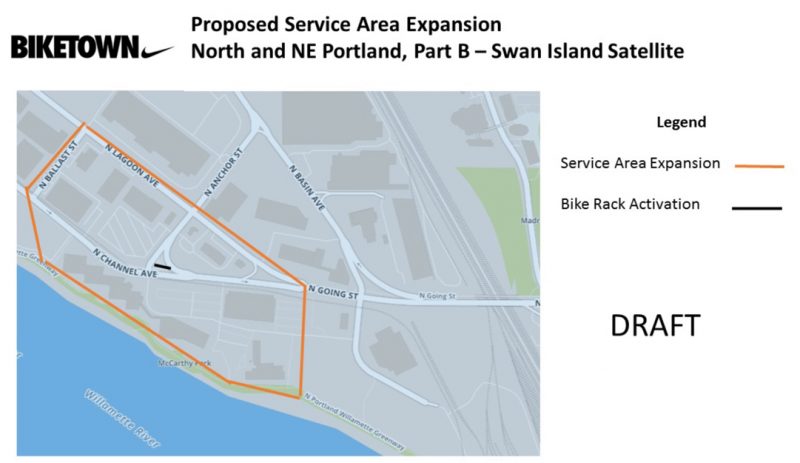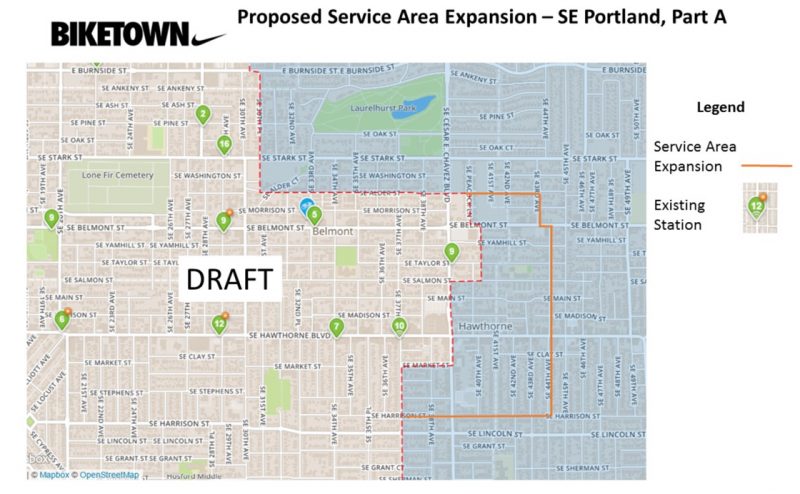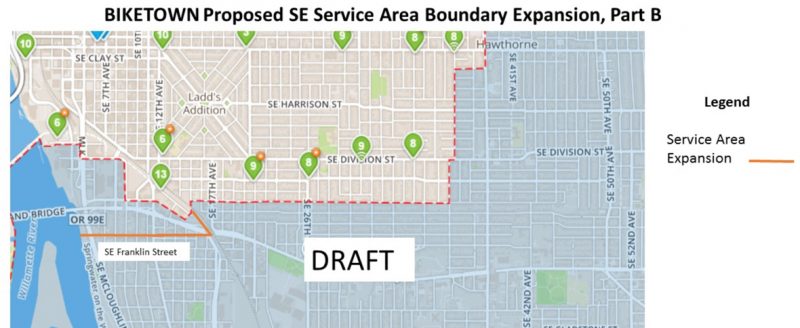Coming up on the one-year anniversary of its launch, the City of Portland is set to announce a proposal to expand the Biketown bike share system.
The changes, which will be officially announced later today, would expand the Biketown service area map by about 20 percent (two square miles) and remove fees for parking outside designated stations in large swaths of downtown (around Portland State University) and the Central Eastside. In addition, PBOT wants to add nine new station locations and remove seven existing ones.
All the expansions come at essentially no cost to the public because there are no plans to add new bikes or additional infrastructure to the system.
We talked all about it this morning with PBOT Operations Manager (and Biketown guy) Steve Hoyt-McBeth. Here’s what’s in store…
‘Community Stations’ coming to Killingsworth and Alberta corridors
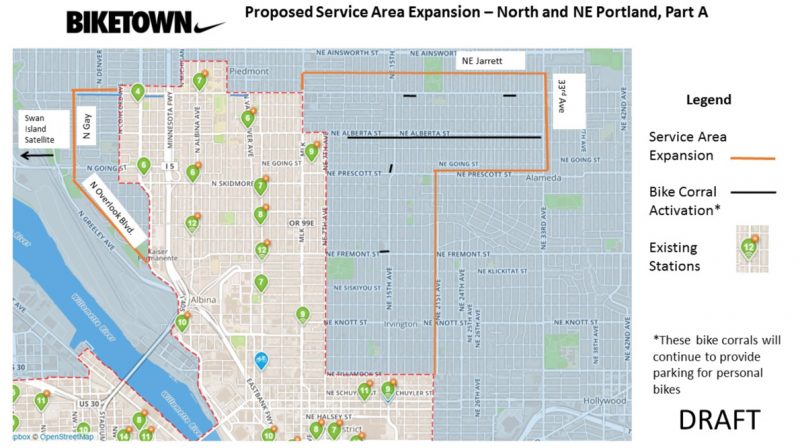
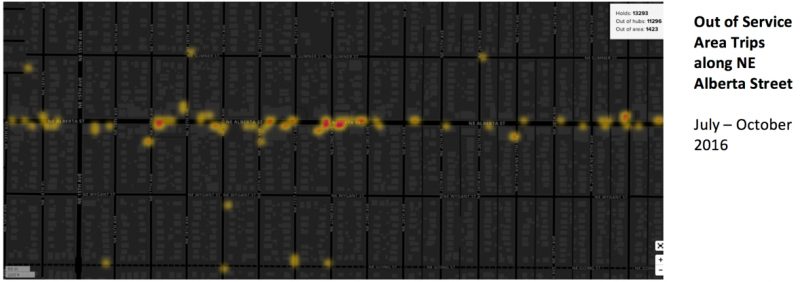
PBOT’s new proposal would turn existing bike corrals into “Community Stations” that would act as both Biketown and private bicycle parking. Because Biketown uses “smart bikes” (all the technology for renting one is on-board and there’s no large kiosk necessary), the system is flexible and the bikes can be parked anywhere. This means the service map isn’t dictated solely by the presence of official stations. All PBOT has to do is draw a new boundary in the “geofence” that tells their system whether or not a bike is parked outside of it.
Customers who end a trip outside the service area are charged a $20 fee. It’s those kind of trips that encouraged PBOT to expand east on Alberta. “Alberta has the highest concentraion of out-of-service-area trips,” says Hoyt-McBeth, “What we’re trying to do is utlitize and leverage the flexibility of the smart bikes along with our robust bike parking infrastructure and investment.”
It helps that the local business association, Alberta Main Street, strongly supports the plan.
For those worried that precious bike parking spaces will be taken over by the bright orange public bikes, Hoyt-McBeth said PBOT’s goal will be for every bike corral to maintain two-thirds parking availability for private bikes. In a related story, PBOT is working on a bike corral usage study that will help them make better decisions about parking use.
In total, five bike corrals on Killingsworth between NE 33rd and North Gay and nine corrals on Alberta between NE 7th and 33rd will become community stations. PBOT will also use corrals on NE 15th at Prescott and Fremont for the new hybrid stations.
For Biketown to work, PBOT must make it visible. Stations are good at that. Without them, users don’t get the visual cues or confidence they need to use the service. To that end, PBOT says they’re looking into branding the bike corrals. They’re likely to use orange stickers and/or pavement markings.
A ‘Swan Island Satellite’
In what will be the only part of the Biketown service area map that’s not contiguous, PBOT will open a satellite zone on Swan Island. Hoyt-McBeth said the move comes after Daimler Trucks North America approached PBOT. The plan is to seed a relatively small area near Daimler’s main buildings (bordered by the Willamette River, Lagoon Avenue, and Ballast Street) with Biketown bikes. Hoyt-McBeth said they’ll add “probably no more than 10” bikes to the area to see how it goes at first. Daimler has agreed to promote Biketown among its employees.
Once the satellite zone is live, users can park bike share bikes at existing bike racks on the Daimler campus and at a nearby TriMet stop.
Hoyt-McBeth sees the Swan Island expansion as a way to reach Daimler employees going between meetings and as a way to make Biketown a more appealing option for people who work on Swan Island and live along the Interstate corridor (which is, a very low-performing area in the Biketown system).
Advertisement
‘Super Hub Zones’ are already live
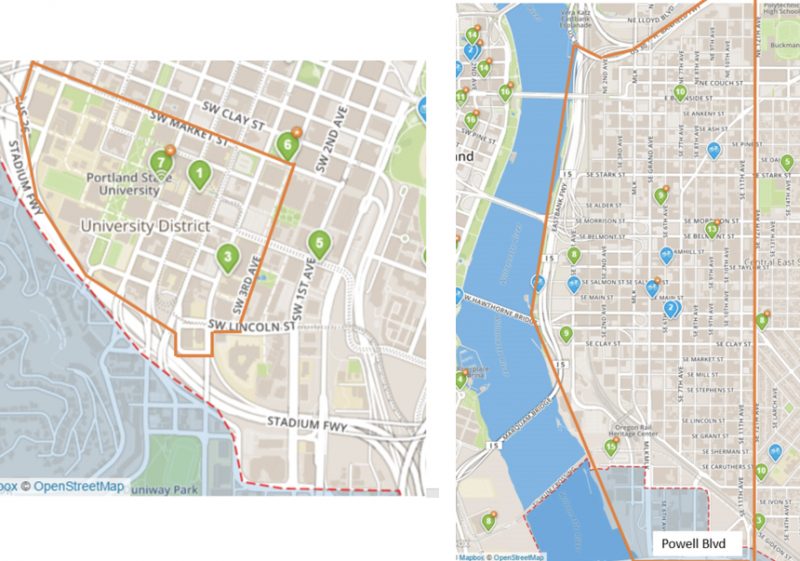
Another way PBOT is leveraging the flexibility of the system is with the creation of “Super Hub Zones.” Encompassing the entire Central Eastside Inudstrial District (from I-84 to 12th Avenue and south to Powell Blvd) and a large area around Portland State University, Biketown users will be able to park at any existing public bike rack without the typical $2 out-of-station charge.
The eastside zone (which has 550 public bike racks in it) is supported by the Central Eastside Industrial District (CEID) and the downtown zone (that has some of the highest bike usage anywhere in Portland) was first requested by PSU as a way to encourage more Biketown use among students.
“It’s like having one big station, a pure, smart-bike system,” Hoyt-McBeth said. The zones are already turned on, so have at it!
The Southeast Expansion
Hoyt-McBeth described the southeast expansions as “more discreet” than the ones in northeast. The new service map will go to SE 43rd and (mostly) 44th along SE Alder and Harrison in order to service the Belmont and Hawthorne commercial corridors east of Calle Cesar Chavez. In a separate expansion, PBOT is proposing to extend the southern boundary to SE Franklin Street between McLoughlin and 13th – 17th. That extension would loop in a key part of the Brooklyn Neighborhood’s commercial corridor on SE Milwaukie (including the Alladin Theater, where PBOT often sees out-of-station activity).
Station removals and relocations
Also part of the proposed changes are nine new stations and the removal of seven others. Here are the new locations:
• N Russell at Williams (social services)
• NW Pettygrove at 14th (affordable housing)
• NE Couch at 3rd (affordable housing)
• NE Schuyler at 2nd Avenue
• SE 8th at Main
• SE 43rd at Belmont Avenue commercial node
• SE 40th at Hawthorne
• SW Naito at Morrison
• SW Moody/Bond and SW Lowell/Bancroft (affordable housing)
And based on an analysis of ridership, equity, cell connectivity, staff safety, accessibility, solar access, constituent feedback and lost meter revenue, PBOT will “relocate” (a.k.a. remove) the following stations:
• N Interstate at Willamette – [This station is ranked 100 out of 100. PBOT says the expanded service area on Killingsworth will make up for this lost access.] interstate and willamette
• NW 23rd at Savier
• SE 29th Avenue at Stark
• SE Ankeny at 28th Avenue (This station was temporarily removed due to construction, this makes it permanent. BIKETOWN has activated two bike corrals, SE 28th and Couch and SE 28th at Pine in the interim. PBOT is considering making it permanent.)
• SE 37th at Hawthorne
• SE Taylor at Cesar Chavez
• SW 11th at Main
Biketown’s ‘long-term vision’
All these changes reflect the confidence PBOT and Motivate (the system’s operator) have in Biketown. It’s also a sign that PBOT isn’t afraid to push the boundaries (literally) of what a smart-bike system is capable of. Without having to make a big investment in bikes and kiosks, PBOT thinks they can get higher utilization of each existing bike (a key metric of a system’s success) by making these relatively small operational and geographic tweaks.
The potential risk is that the expanded area results in fewer bikes available overall. The density of stations and bikes is one of the top factors that determines whether a bike share system succeeds or fails. Asked why they don’t just add more bikes to the system, Hoyt-McBeth said he’d love to, but they don’t have the funds right now. “And our utilization rate,” he added, “is at a place where we feel there’s capacity to expand.” PBOT also feels like they’re over-the-hump in terms of public understanding of the system and their own ability to operate it well.
Now is the right time, Hoyt McBeth feels, to take advantage of the system’s inherent flexiblity. “This is part of our long-term vision for choosing a smart bike system.”
What wasn’t part of Portland’s long term vision was the flood of smart-bikes that are taking over cities in China. At the Bicycle Advisory Committee meeting last month, Hoyt-McBeth acknowledged that bike share competitors (like Ofo) oare likely to test Portland waters eventually. By making these expansions now, he hopes Biketown can stave them off. “This makes our market a little less attractive to those competitors,” he said.
To comment on these changes, PBOT has put together an online survey. They’re taking feedback until May 19th, at which time PBOT Director Leah Treat will make the final decision to move forward.
— Jonathan Maus: (503) 706-8804, @jonathan_maus on Twitter and jonathan@bikeportland.org
BikePortland is supported by the community (that means you!). Please become a subscriber or make a donation today.

